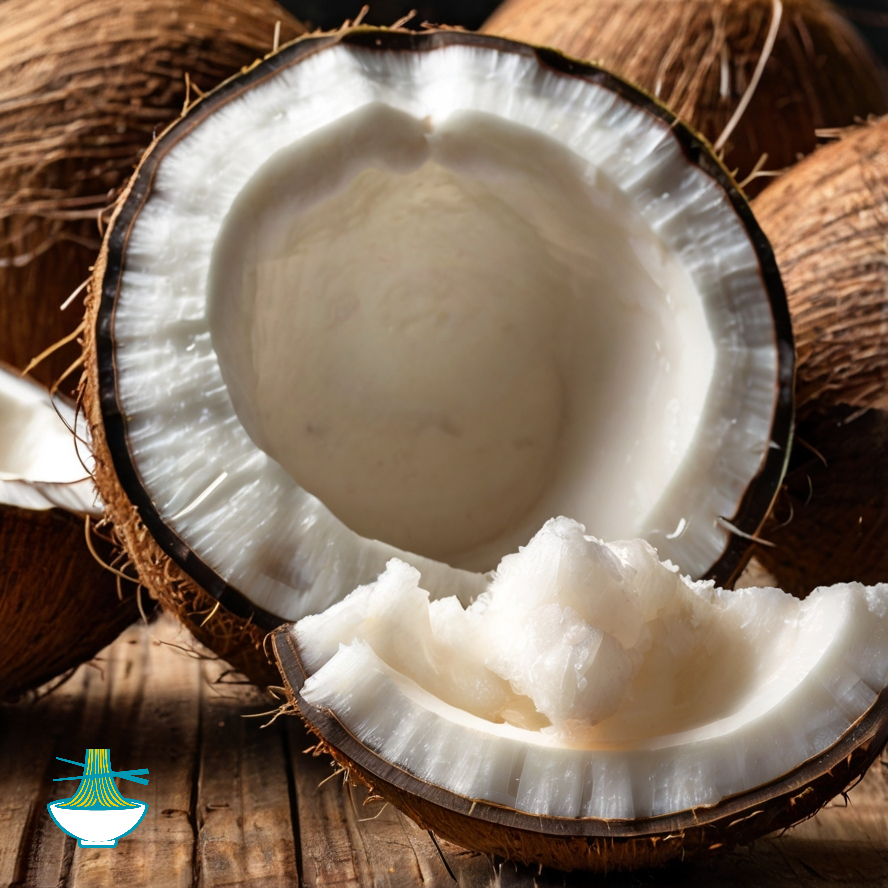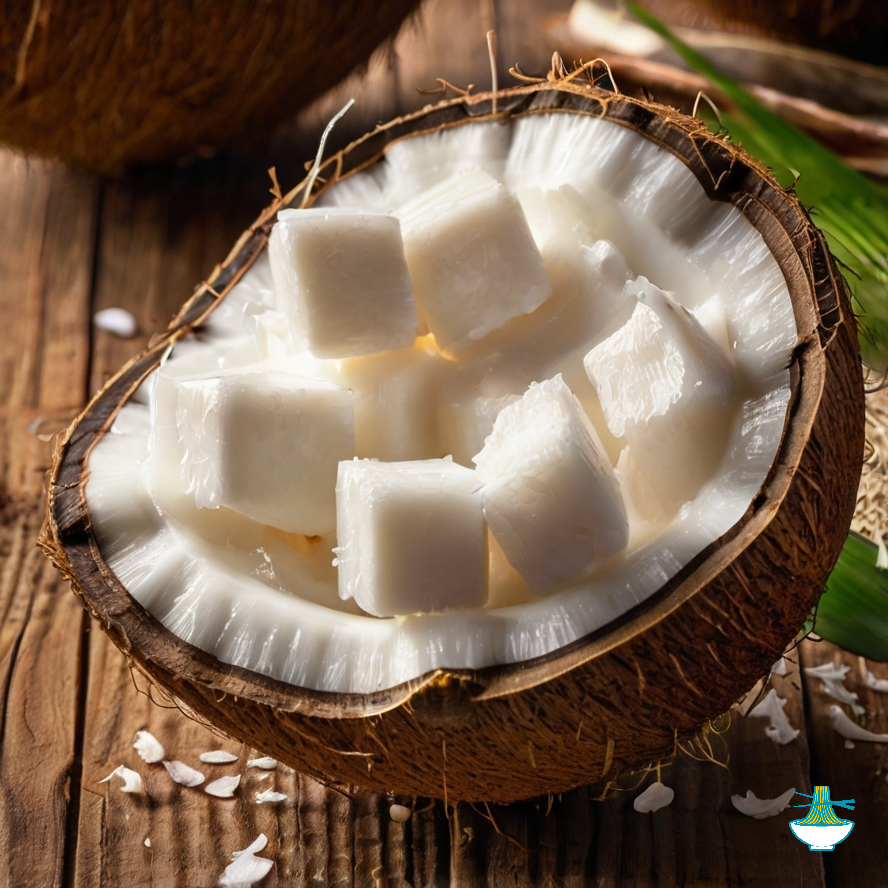Discover coconut’s versatile role in cooking,from milk to oil to chickenMarinade, creamysauce to vegetable to sweet and more! all you need to use in cooking🌴🍳
 Coconuts offer a wealth of culinary possibilities. From creamy coconut milk to fragrant oil and finely grated flesh, this tropical fruit enhances dishes with its rich flavor and texture. Dive into recipes and tips to unlock coconut’s culinary potential in your kitchen! 🥥🍽️
Coconuts offer a wealth of culinary possibilities. From creamy coconut milk to fragrant oil and finely grated flesh, this tropical fruit enhances dishes with its rich flavor and texture. Dive into recipes and tips to unlock coconut’s culinary potential in your kitchen! 🥥🍽️
Ingredients:
- 1 tablespoon coconut oil
- 1 onion, chopped
- 3 cloves garlic, minced
- 1 tablespoon ginger, grated
- 2 tablespoons curry powder
- 1 teaspoon turmeric powder
- 1 teaspoon cumin
- 1 teaspoon coriander
- 1 can (13.5 oz) coconut milk
- 1 cup chicken broth
- 1 lb chicken breast, cut into cubes
- 1 red bell pepper, sliced
- 1 cup snow peas
- Salt and pepper to taste
- Cooked rice, for serving
- Fresh cilantro, for garnish
- Shredded coconut, for garnish (optional)

Instructions:
1-In a large skillet, heat coconut oil over medium heat. Add chopped onion and cook until translucent, about 3-4 minutes.
2-Add minced garlic and grated ginger to the skillet, cook for another 1-2 minutes until fragrant.
3-Stir in curry powder, turmeric, cumin, and coriander, cooking for 1 minute until spices are toasted and fragrant.
4-Pour in coconut milk and chicken broth, stirring to combine. Bring the mixture to a simmer.
5-Add chicken breast cubes to the skillet, allowing them to cook in the simmering sauce for about 8-10 minutes or until cooked through.
6-Once the chicken is cooked, add sliced red bell pepper and snow peas to the skillet. Cook for an additional 3-4 minutes until the vegetables are tender but still crisp.
7-Season the curry with salt and pepper to taste.
8-Serve the coconut curry chicken over cooked rice, garnished with fresh cilantro and shredded coconut if desired.
Enjoy this flavorful and aromatic Coconut Curry Chicken, showcasing the delicious versatility of coconut in various forms!
Nutritional Values :
Coconut oil (1 tablespoon):
- Calories: 120
- Fat: 14g
- Saturated Fat: 12g
- No carbohydrates or protein
benefits:
- Contains medium-chain triglycerides (MCTs) which may promote weight loss and boost metabolism.
- Rich in lauric acid, which has antimicrobial and anti-inflammatory properties.
- May support heart health by raising HDL (good) cholesterol levels.
Onion (1 medium):
- Calories: 44
- Carbohydrates: 10g
- Fiber: 2g
- Protein: 1g
benefits:
- High in antioxidants, particularly quercetin, which may have anti-inflammatory and anti-cancer effects.
- Contains prebiotic fibers that promote gut health and digestion.
- May help lower blood sugar levels and reduce the risk of heart disease.
Garlic (3 cloves):
- Calories: 13
- Carbohydrates: 3g
- Fiber: 0.2g
- Protein: 0.6g
benefits:
- Has antibacterial and antiviral properties that may help boost the immune system.
- Contains sulfur compounds like allicin, which may lower blood pressure and improve cholesterol levels.
- May have anti-inflammatory effects and contribute to the prevention of certain cancers.
Ginger (1 tablespoon):
- Calories: 4
- Carbohydrates: 1g
- Fiber: 0.1g
- Protein: 0.1g
benefits:
- Known for its anti-nausea and digestive properties, aiding in digestion and reducing motion sickness.
- Contains gingerol, a potent antioxidant with anti-inflammatory effects that may help alleviate muscle pain and osteoarthritis symptoms.
- May help reduce menstrual pain and lower blood sugar levels.
Curry powder (2 tablespoons):
- Calories: 42
- Carbohydrates: 8g
- Fiber: 5g
- Protein: 2g
Turmeric powder (1 teaspoon):
- Calories: 8
- Carbohydrates: 2g
- Fiber: 0.6g
- Protein: 0.2g
benefits:
- Contains curcumin, a powerful antioxidant and anti-inflammatory compound with potential benefits for joint health and arthritis management.
- May help improve brain function and reduce the risk of neurodegenerative diseases like Alzheimer's.
- Could potentially lower the risk of heart disease and cancer due to its anti-inflammatory properties.
Cumin (1 teaspoon):
- Calories: 8
- Carbohydrates: 1g
- Fiber: 0.1g
- Protein: 0.4g
benefits:
- Rich in antioxidants, cumin may help reduce inflammation and oxidative stress in the body.
- Contains compounds like thymoquinone, which may have anti-cancer properties.
- May aid in digestion and improve blood sugar control.
Coriander (1 teaspoon):
- Calories: 5
- Carbohydrates: 1g
- Fiber: 0.8g
- Protein: 0.2g
benefits:
- Contains antioxidants like quercetin and tocopherols, which may help protect against oxidative damage and inflammation.
- May have antimicrobial properties and help promote digestive health.
- Could potentially lower blood sugar levels and cholesterol levels.
Coconut milk (13.5 oz can):
- Calories: 792
- Fat: 78g
- Carbohydrates: 8g
- Protein: 8g
benefits:
- Rich in healthy fats, coconut milk may support heart health and promote satiety.
- Contains lauric acid, which has antimicrobial properties and may support immune function.
- Provides vitamins and minerals like iron, magnesium, and potassium.
Chicken broth (1 cup):
- Calories: 86
- Fat: 2g
- Carbohydrates: 4g
- Protein: 10g
benefits:
- High in protein, which is essential for muscle growth and repair.
- Rich in vitamins and minerals, including B vitamins, phosphorus, and selenium.
- Provides a lean source of protein, which may support weight management and muscle health.
Chicken breast (1 lb):
- Calories: 506
- Fat: 6g
- Saturated Fat: 2g
- Carbohydrates: 0g
- Protein: 104g
benefits:
- High in protein, which is essential for muscle growth and repair.
- Rich in vitamins and minerals, including B vitamins, phosphorus, and selenium.
- Provides a lean source of protein, which may support weight management and muscle health.
Red bell pepper (1 medium):
- Calories: 37
- Carbohydrates: 9g
- Fiber: 3g
- Protein: 1g
benefits:
- High in vitamin C, which boosts immune function and collagen production.
- Contains antioxidants like beta-carotene, which may protect against certain chronic diseases.
- Provides fiber, which supports digestive health and may help reduce the risk of heart disease.
Snow peas (1 cup):
- Calories: 35
- Carbohydrates: 7g
- Fiber: 3g
- Protein: 3g
benefits:
- Low in calories and high in fiber, making them a great option for weight management and digestive health.
- Rich in vitamin C, which supports immune function and skin health.
- Contains antioxidants that may help protect against oxidative stress and inflammation.
Nutritional values are approximate and may vary based on factors such as brand, cooking methods, and specific ingredients used.


Comments